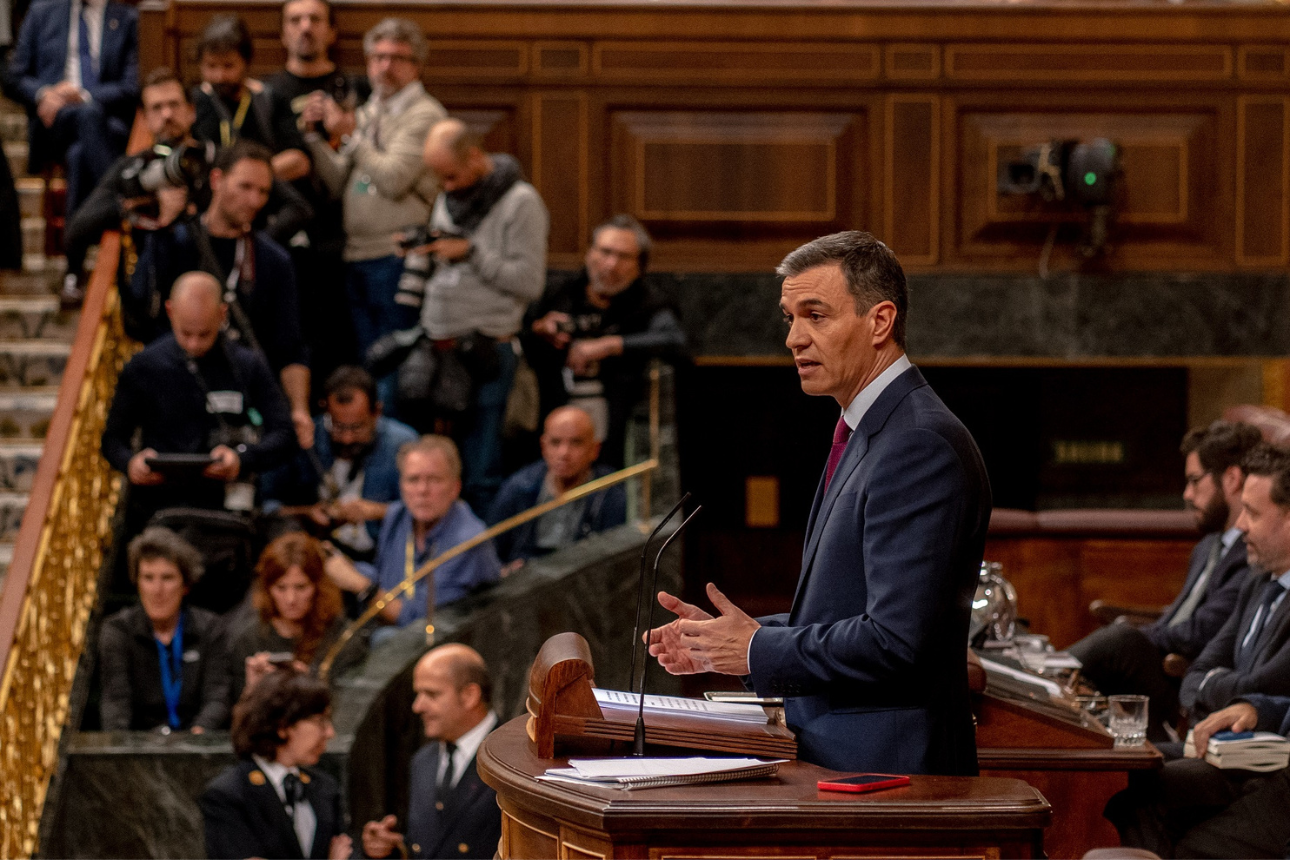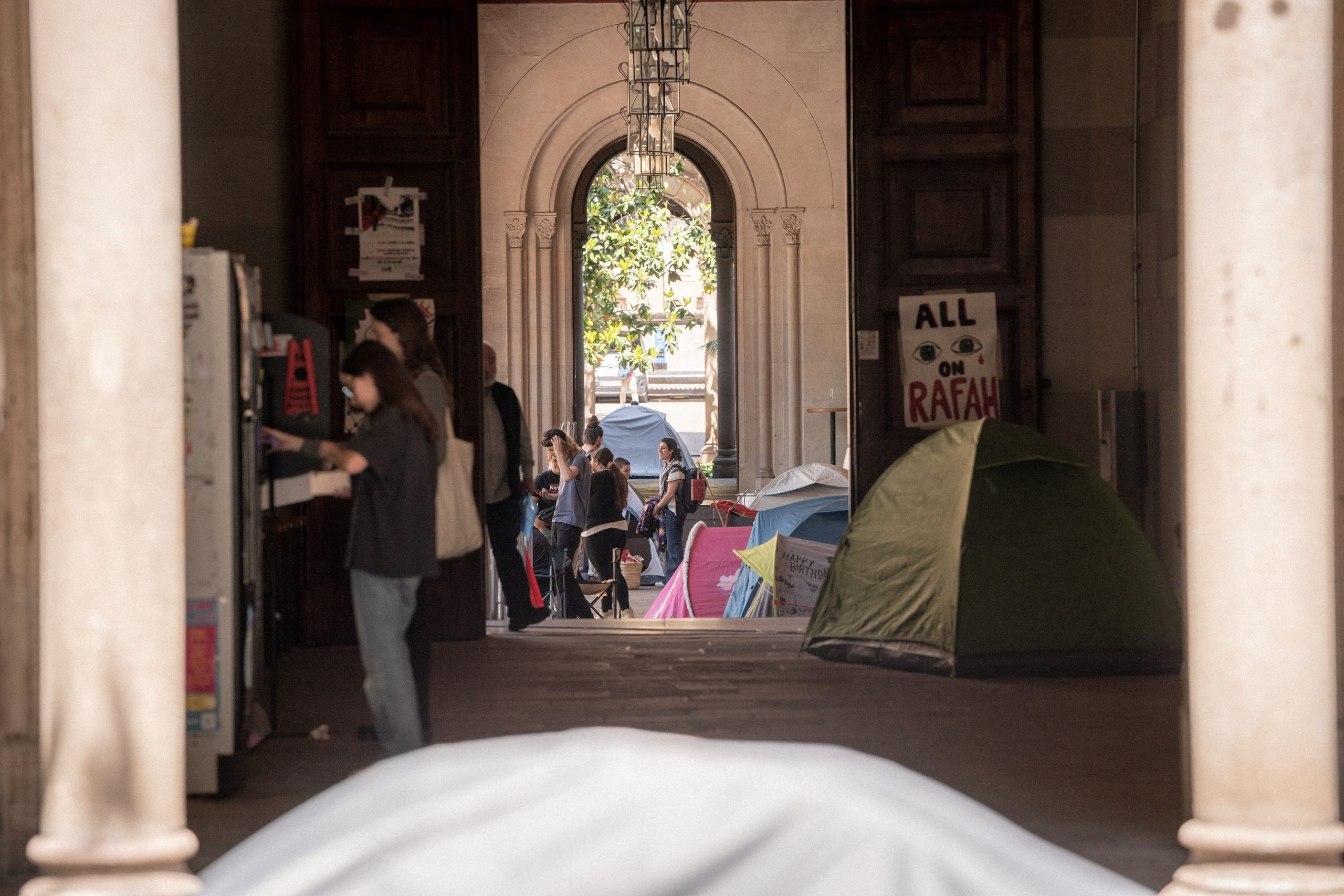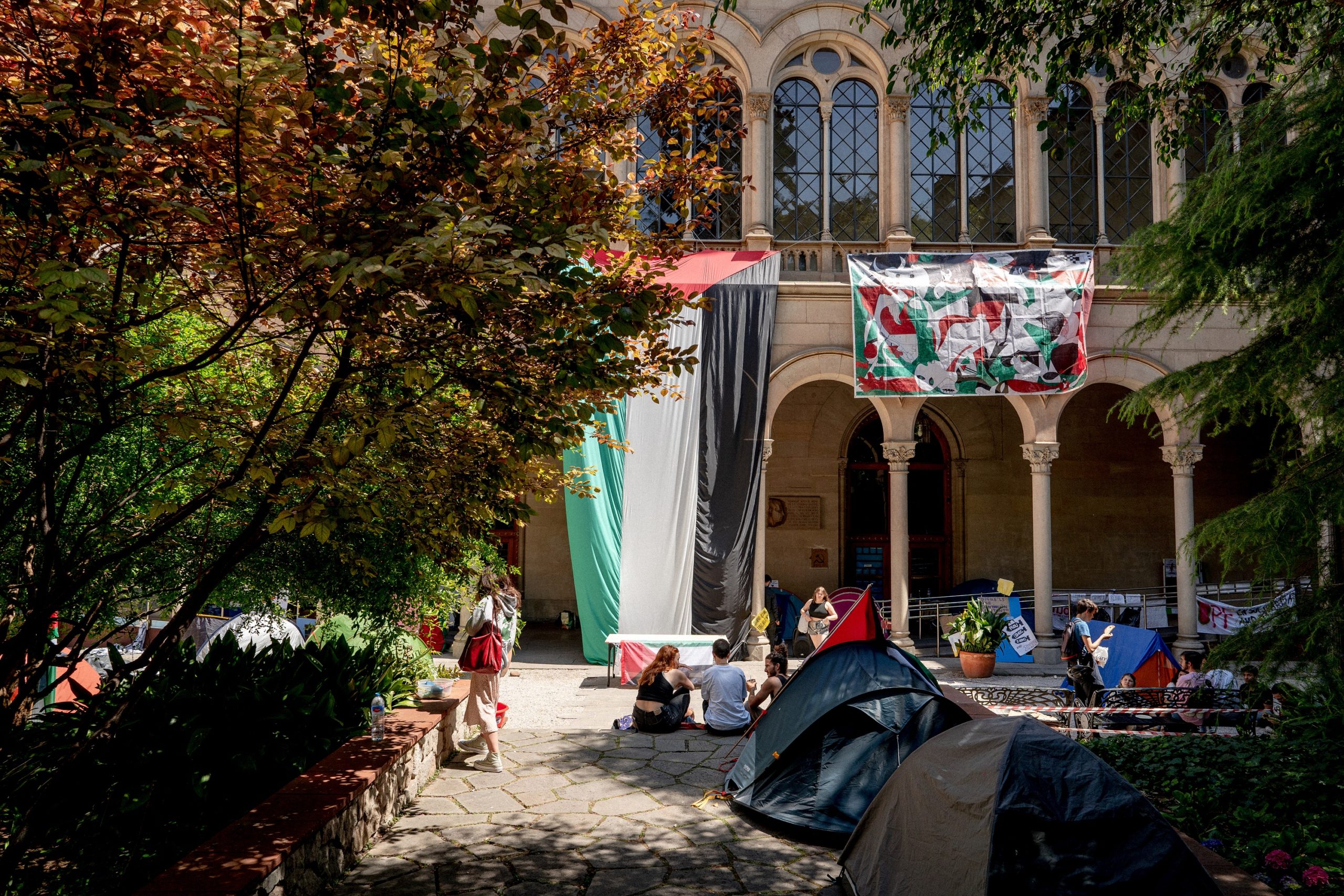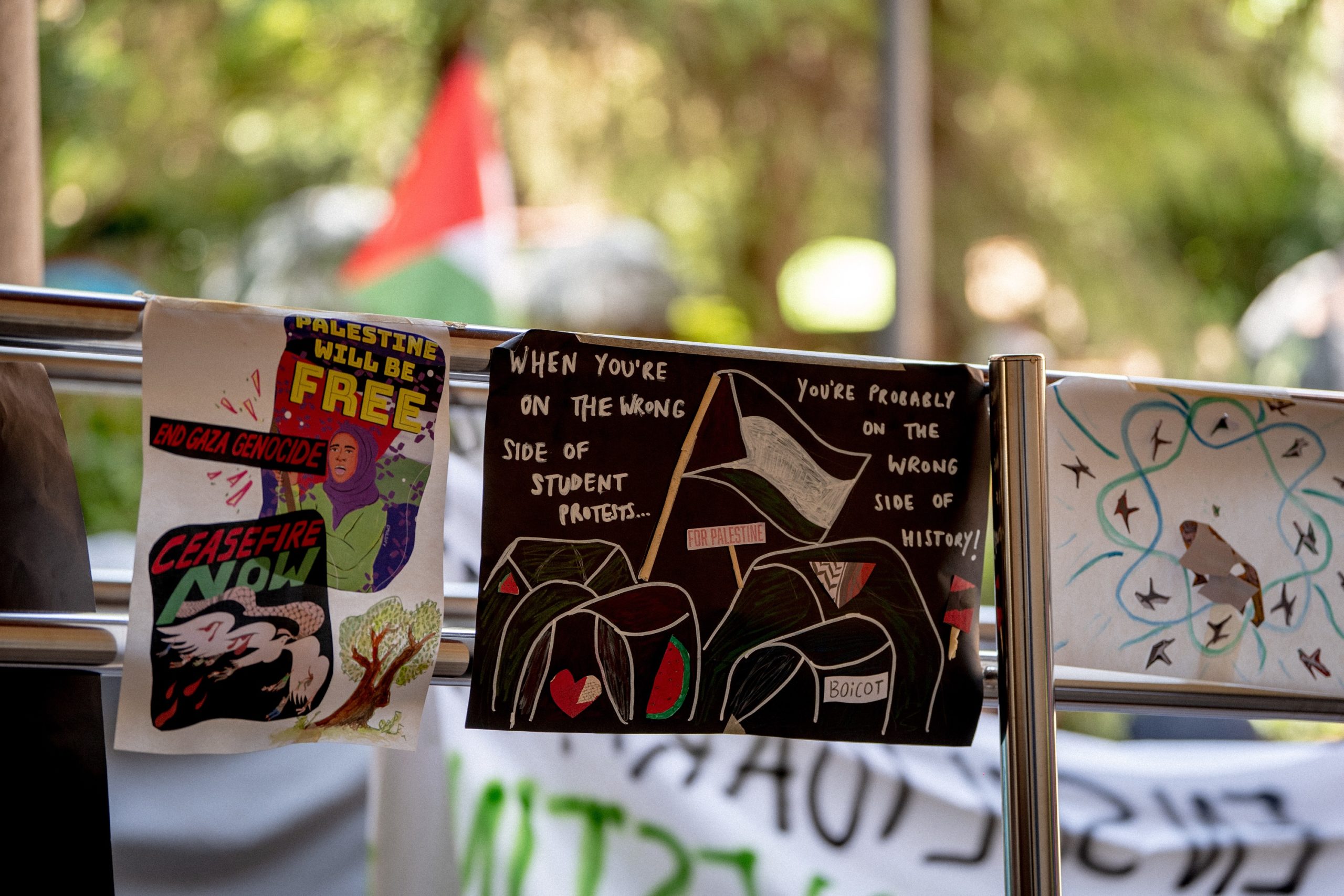
By John McAulay
While the Israeli government lashes back at Spain for recognizing the State of Palestine, activists argue that the gesture is far from enough.
Something seems off in the Historic Building of the University of Barcelona. The 150-year-old corridors look mostly ordinary, bustling with students and teachers coming and going, but there is a visible tell-tale sign that confirms that these are exceptional times. On the walls all around, several banners painted in black, white, green, and red indicate the way to the pro-Palestinian encampment that has been set up in the main courtyard.
Like so many other universities around the world, this one in Barcelona ─along with a couple dozen others around Spain─ has set up an eye-catching protest to denounce the ongoing massacre in the Gaza Strip. Activists in their hundreds, moved by the experience in American colleges, have made camp here in makeshift tents, adding their grain of sand to the wave of pressure that has been put on Western governments to aid the Palestinian cause.
And Spain has positively responded. Last week, Prime Minister Pedro Sánchez stood in front of the national Congress and informed that the leftist coalition government had reached an agreement to formally recognize the State of Palestine on Tuesday, the 28th of May. Ireland and Norway have also followed through, in a three-way orchestrated announcement.
A Long Time Coming
The decision is not hasty or rash but has been steadily approaching. Although Pedro Sánchez’s initial reaction to the 7th of October attacks involved condemning Hamas’ “terrorist” attack and mourning Israeli casualties, the prime minister has changed course following the brutal military response that has killed thousands of Palestinians and devastated the Gaza Strip.
In the last seven months, he has repeatedly called for a permanent ceasefire, visiting the Middle East on four occasions during this time in an effort to end the war. He even embarked on a lackluster European tour in April to try and garner support in recognizing the State of Palestine and convince other governments to follow suit – without too much success.
Where support has been unwavering, however, is within his own country. In his speech last Tuesday, Pedro Sánchez argued that the decision “echoes the majority feeling of the Spanish people”. The country’s main cities have seen massive demonstrations, with thousands pouring onto the streets in solidarity with Palestinians.

Meanwhile, a recent survey by the Spanish Royal Institute Elcano shows that 78% of people believe the rest of Europe should follow Spain in recognizing the State of Palestine, while seven out of ten hold that Israel is committing “genocide” in the Gaza Strip.
The move by Spain, Ireland, and Norway is not isolated. In recent weeks, four other countries – all from the Caribbean – have also taken the same step, raising the current total of United Nations member states that recognize Palestine to 145. Until today, only a couple of these – Malta and Sweden – were in Western Europe. The three new additions could herald a larger wave of solidarity from this influential part of the world.
Israel Lashes Back
Another question, however, is whether recognizing the State of Palestine will actually amount to any concrete progress in solving the decades-long conflict with Israel. Although it has geopolitical implications in that it shows a trend of growing support, expert voices agree that it will not go far beyond that.
“It is a symbolic gesture, focused on putting global pressure on Israel”, argues Beatriz Gutiérrez, International Relations teacher at the European University in Spain, in a conversation with The Palestine Chronicle. “I do not believe it will have tangible effects beyond adding a certain pressure to end the war in the Gaza Strip or achieving a ceasefire”.
In fact, she assumes the move will have a larger impact “at the bilateral level” between Spain and Israel, with a strong backlash expected to unfold.

Benjamin Netanyahu’s government has already revealed its first retaliation plans. Having recalled its ambassador to Spain, on Monday the Ministry of Foreign Affairs ordered the Spanish consulate in Jerusalem to stop providing service to Palestinians in the West Bank, as the office de facto serves to manage diplomatic ties with the Palestinian Authority and oversees humanitarian programs. Minister Israel Katz said this was a “preliminary punitive measure”, and was prepared to go further if his order was not complied with.
In fact, the relationship between both governments has soured aggressively in recent weeks, as Spain has bolstered its commitment to the Palestinian cause. While ministers Yolanda Díaz and Margarita Robles have used the slogan ‘From the river to the sea’ and equated the situation in the Gaza Strip to a “real genocide”, the Israeli government has responded by accusing Spain of rendering service to Hamas and warning that “we harm those who harm us”.
Cutting All Ties?
In reality, recognizing the State of Palestine may not be as audacious or damaging to Israeli interests as it would seem. Spain has boasted a healthy relationship with the Palestinian Authority for many decades, and the move doesn’t change the fact that the occupation forces continue to have full control of the West Bank.
“What does this recognition entail?”, asks Spanish activist Nour Torelló, talking to the Palestine Chronicle. “The Palestinian State is currently unfeasible, and Israel has made sure it stays this way by building illegal settlements and dividing its people”.
Instead, she argues, Spain should look at “cutting all diplomatic, institutional, commercial and cultural ties with the occupying power”, until Israel becomes a “pariah state”.
It’s a demand in line with what the BDS movement calls for, but hard to accept, as trade between both countries recently reached a record high of 3 billion euros in 2022. Nour, who has Palestinian roots and is a member of the coalition Enough Complicity with Israel, points out that these figures include large imports and exports of weapons, and calls for an embargo.

Breaking away from Israel is possible, however, and the students at the University of Barcelona have proved it. After just two weeks camping on the grounds, they have forced the directive board to sign a commitment: it will not establish any agreements with Israeli institutions or take part in common academic events “until conditions in the Gaza Strip respect human rights”.
Following this historic move, the activists decided to abandon the protest, recognizing that they had gone further than they ever expected.
As they prepare to enjoy their last meal ─a bean stew that has been donated by a local association of Moroccan women─ out of paper plates around the remaining tents, they can’t help but feel that their strategy is more effective and principled than that being drawn up in the high offices of the Spanish government.
“It doesn’t make sense to recognize the State of Palestine, but then continue buying and selling weapons with Israel”, one points out. Her friend, putting down the half-eaten dish in his hand, calls for other segments of society to follow the experience of the University of Barcelona and put pressure on breaking every tie with Israel. “It’s the small battles we win that make a change”.
(The Palestine Chronicle)

– John McAulay is a journalist based in Barcelona with an interest in social issues and international conflicts. He contributed this article to The Palestine Chronicle.








Bold move or symbolic gesture?
BOTH.